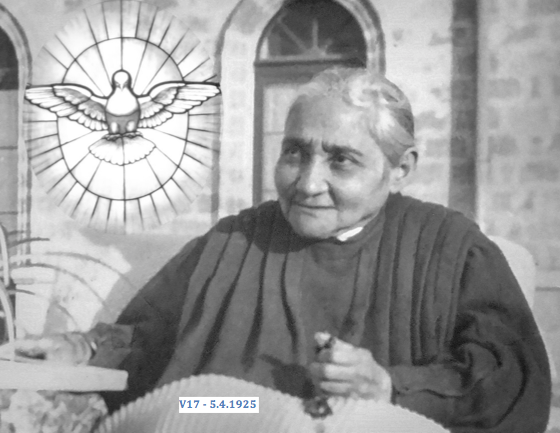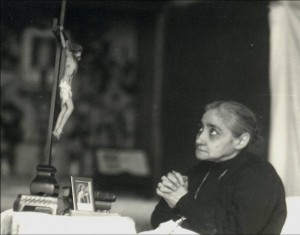Feast of St. Therese of Lisieux (1873-1897)
Virgin, Doctor of the Church
More information on St. Therese of Lisieux can be found at the websites:
http://www.littleflower.org/
http://www.thereseoflisieux.org/
http://www.sttherese.com/
The Servant of God, Luisa Piccarreta the Little Daughter of the Divine Will
(Note the Holy Card of St. Therese at the foot of the Crucifix)
St. Therese of Lisieux was a favored Saint
of the Servant of God, Luisa Piccarreta the Little Daughter of the Divine Will
St Therese of the Child Jesus, pray for us!
“I will spend my Heaven doing good upon the earth. I will let fall a shower of roses”
From St Therese of Lisieux’s Autobiography “The Story of a Soul“:
Therese Martin was the last of nine children born to Louis and Zelie Martin on January 2, 1873, in Alencon, France. However, only five of these children lived to reach adulthood. Precocious and sensitive, Therese needed much attention. Her mother died when she was 4 years old. As a result, her father and sisters babied young Therese. She had a spirit that wanted everything.
At the age of 14, on Christmas Eve in 1886, Therese had a conversion that transformed her life. From then on, her powerful energy and sensitive spirit were turned toward love, instead of keeping herself happy. At 15, she entered the Carmelite convent in Lisieux to give her whole life to God. She took the religious name Sister Therese of the Child Jesus and the Holy Face. Living a hidden, simple life of prayer, she was gifted with great intimacy with God. Through sickness and dark nights of doubt and fear, she remained faithful to God, rooted in His merciful love. After a long struggle with tuberculosis, she died on September 30, 1897, at the age of 24. Her last words were the story of her life: “My God, I love You!”
The world came to know Therese through her autobiography, “Story of a Soul”. She described her life as a “little way of spiritual childhood.” She lived each day with an unshakable confidence in God’s love. “What matters in life,” she wrote, “is not great deeds, but great love.” Therese lived and taught a spirituality of attending to everyone and everything well and with love. She believed that just as a child becomes enamored with what is before her, we should also have a childlike focus and totally attentive love. Therese’s spirituality is of doing the ordinary, with extraordinary love.
Therese saw the seasons as reflecting the seasons of God’s love affair with us. She loved flowers and saw herself as the “little flower of Jesus,” who gave glory to God by just being her beautiful little self among all the other flowers in God’s garden. Because of this beautiful analogy, the title “little flower” remained with St. Therese.
Her inspiration and powerful presence from heaven touched many people very quickly. She was canonized by Pope Pius XI on May 17, 1925. Had she lived, she would have been only 52 years old when she was declared a Saint.
“My mission – to make God loved – will begin after my death,” she said. “I will spend my heaven doing good on earth. I will let fall a shower of roses.” Roses have been described and experienced as Saint Therese’s signature. Countless millions have been touched by her intercession and imitate her “little way.” She has been acclaimed “the greatest saint of modern times.” In 1997, Pope John Paul II declared St. Therese a Doctor of the Church – the only Doctor of his pontificate – in tribute to the powerful way her spirituality has influenced people all over the world.
Two excerpts from the Book of Heaven
Volume One, the Servant of God
Luisa Piccarreta the Little Daughter of the Divine Will writes:
… Then He (Jesus) continued: “I have made great designs upon you (Luisa), as long as you correspond to Me – I want to make of you a perfect image of Me, from the moment I was born up to my death. I (Jesus) Myself will teach you (Luisa), little by little, how to do it.” …
… “Lord”, I (Luisa) said to Him (Jesus), “I lack everything – I have nothing”
And He (Jesus) said to me (Luisa): “Do not fear, little by little we will do everything. I Myself know how weak you are, but it is from Me that you must draw strength.”
As well as from the other Volumes of the Book of Heaven:
Volume 2 – September 5, 1899
This morning I found myself in such disheartenment and I saw myself so bad, that I
myself rendered myself unbearable. When Jesus came, I told Him of my pains and
the miserable state in which I was, and He said to me: “My daughter, do not
want to lose heart. It is my usual way to operate perfection little by little,
and not everything in one instant, so that, in seeing that she is always lacking
something, the soul may push herself and make all efforts in order to reach
what she lacks, to please Me more and to sanctify herself more. …
Volume 3 – January 1, 1900
… Oh, how sorry I felt for Him! I felt absorbed in that bitterness; and the blessed little Baby, compassionating my miserable state, told me: “The more the soul
humiliates herself and knows herself, the closer she draws to the truth; and
being in the truth, she tries to push herself along the path of virtues, from
which she sees herself very far away. And if she sees herself on the path
of virtues, immediately she realizes how much there is left for her to do,
because virtues have no end – they are infinite, as I am. So, being in
the truth, the soul always tries to perfect herself, but she will never arrive
at seeing herself perfect. And this serves her, and it will make her work
continuously, striving to perfect herself more, without wasting time in
idleness. And I, pleased with this work, keep retouching her little by little, in
order to portray My likeness in her.
Volume 3 – August 1, 1900
… Placing himself before My Humanity, which spreads temperate rays of the Divinity, man has the good of being able to Purify, Sanctity and even Divinize himself in My very Deified Humanity.
Therefore, you – remain always before My Humanity, keeping it as a mirror through which you will clean all of your stains; not only this, but as a mirror through which, by reflecting yourself in it, you will acquire beauty, and little by little you will keep adorning yourself in My own likeness. …
Volume 10 – November 29, 1910
Since a good and holy priest was coming, I was a little bit anxious to speak with him, especially about my current state, in order to know the Divine Will. Now, after he came the first and the second time, I saw that nothing would be done of what I wanted. So, having received Holy Communion, all afflicted, I was repeating my great affliction to my affectionate Jesus, saying to Him: “My Life, my Good and my All, it shows that You alone are everything for me. I have never found in any creature, as good and holy as he might be, a word, a comfort, a solution for the slightest doubt of mine. It shows how there is to be no one for me, but You alone: You alone – the All for me, and I alone, alone – always alone for You. And so I abandon myself in You, completely and always. As bad as I am, have the goodness of holding me in your arms, without leaving me for one single instant.”
While I was saying this, my blessed Jesus made Himself seen looking in my interior, turning everything upside down to see if there was something which He did not like. And while turning and turning, He (Jesus) took something like a grain of white sand in His hands, and He threw it to the ground. Then He said to me: “Dearest daughter of Mine, it is absolutely right that for one who is all for Me, I be all for her. I am too jealous that someone else might give her the slightest comfort. I alone – I Myself alone want to make up for all, and in everything. What is it that afflicts you? What do you want? I do everything to make you content. Do you see that white grain that I removed from you? It was nothing but a little bit of anxiety, for you wanted to know My Will from others. I removed it from you and I threw it on the ground so as to leave you in holy indifference – the way I want you. And now I will tell you what My Will is: I want Mass and also Communion; as for whether or not you must wait for the priest to come round, you will be indifferent to this. If you feel dozy, you will not try to come round; and if you feel awake, you will not try to doze off. However, know that I want you always ready, and always at your post of victim, even if you should not always suffer. I want you like the soldiers in the battle field: even if the act of fighting is not continuous they remain with their weapons ready, and if necessary, seated in the quarters, so that every time the enemy tries to start the fight, they may always be ready to defeat him. The same for you, My daughter: you will remain always ready, always at your post, so that every time I should want to make You suffer either for My relief or to hold back chastisements, or for anything else, I may find you always ready. I do not have to always call you, or dispose you to the sacrifice each time; but rather, you will consider yourself as being always called, even if I should not always keep you in the act of suffering. So, we have understood each other, haven’t we? Be tranquil, and fear nothing.”
This is very similar to what the “Little Flower” St. Therese of Lisieux wrote in her journal called “The Story of a Soul”:
Unfortunately when I have compared myself with the saints, I have always found that there is the same difference between the saints and me as there is between a mountain whose summit is lost in the clouds and a humble grain of sand trodden underfoot by passers-by. Instead of being discouraged, I told myself: God would not make me wish for something impossible and so, in spite of my littleness, I can aim at being a saint. It is impossible for me to grow bigger, so I put up with myself as I am, with all my countless faults. But I (St. Therese) will look for some means of going to heaven by a little way which is very short and very straight, a little way that is quite new.
After St. Therese’s death in 1897 her Sisters sent 2,000 copies of Therese’s writings to other convents. By 1910 St. Therese’s writings would be well know by the Religious in Luisa’s hometown. It was also in 1910, while visiting the Trani Diocese to establish an orphanage, Saint Annibale Di Francia met Luisa Piccarreta for the first time, most likely at the suggestion of her confessor, Fr. Gennaro Di Gennaro. Soon thereafter, Saint Annibale found himself at the center of a loose association of priests who shared a common thirst for holiness and a deep admiration for Luisa. Members of the group included Father Gennaro Braccale, S.J.; Father Eustacchio Montemuro, founder of the Sisters of the Divine Side; and Father Ferdinando Cento, who later became a Cardinal.


